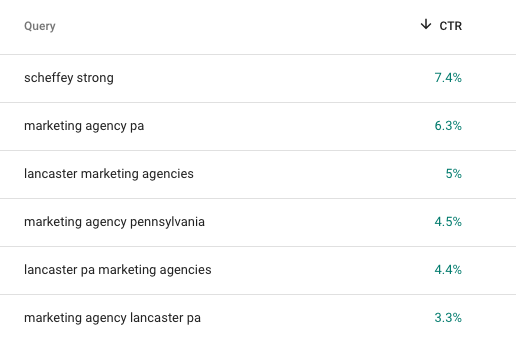Analyzing Your Website’s SEO Effectiveness
 As any business owner can tell you, getting Google to feature your company on their first Search Engine Results Page (SERP) is a confusing and often frustrating process. When we get a call from a business looking for Search Engine Optimization (SEO) services we hear frustrations like, “I am adding content to my website all of the time. Why doesn’t my organic traffic increase?” and “I have a lot of traffic from search engines, but none of them take further action. Why is that?”
As any business owner can tell you, getting Google to feature your company on their first Search Engine Results Page (SERP) is a confusing and often frustrating process. When we get a call from a business looking for Search Engine Optimization (SEO) services we hear frustrations like, “I am adding content to my website all of the time. Why doesn’t my organic traffic increase?” and “I have a lot of traffic from search engines, but none of them take further action. Why is that?”
Oftentimes people feel like they are wasting their time when it comes to SEO. Unfortunately, Google (Bing, Yahoo, etc.) is a digital entity that cannot see how great your company is. They are limited to evaluating you on a particular set of website and online factors. If you are not consistently working to influence those factors, then Google cannot rank your business effectively.
Evaluating your website’s SEO and effectively responding to what you find is essential to steadily improving how your website appears to search engines like Google. If you’ve already put the critical SEO elements in place, you’ll need to repeatedly ask yourself key questions to ensure your consistent SEO tweaks are helping your website visibility.
Key Questions for Analyzing Your SEO
1. What is your keyword rank?
At the outset of your SEO work, you should have identified phrases and words that are relevant to your company and should result in your website’s appearance on a SERP. These should be words you’ve researched and built your SEO strategy around. After selecting your phrases, use a tool like Moz or Wordstream to evaluate how you currently rank for those terms. (You can’t just type the words into Google yourself to see how you rank: your own search history, location, the device used, and other factors will influence what results Google shows you.)
Keep in mind your rank will fluctuate from day to day. Watching your keyword rank over time can help you see how effective your website is at attracting organic traffic.
2. What search terms are people using to find my page or site? (Are they what you were hoping for?)
SEO is exactly like any other kind of marketing: you need to keep your target audience at the top of your mind. Understanding what people are typing into search engines before they come to your website is a key part of understanding your audience. A great tool for this is Google Search Console. This is a free tool that helps with a wide variety of SEO intel, like showing you what keywords your site ranks for, what position you rank for those keywords, and how often people are clicking to your site after typing in a specific search.
Take a look at your website’s Google Search Console Performance to see the top “queries” or search terms that drove visitors to your site. You can filter the queries by a specific page if you are evaluating that page’s SEO performance.
Play around! What keywords resulted in the most impressions and clicks? Are they the same words you were hoping to rank for? If not, you need to evaluate the kind of content that’s on your website.
3. How often was your page/site viewed but not clicked?
Still looking at Google Search Console, take a look at the keywords that are important to you. How often did people click on your site when it was viewable in Google’s search results?
Let’s look at an example:
Scheffey offers branding services, including refreshing your brand. If a company is trying to decide whether or not they should revamp their brand, they might look for examples of other companies who did a brand refresh.

Looking at the Query, “brand refresh examples,” Scheffey appeared in the search engine results 540 times. People clicked the result 68 times (going to this Brand Refresh v Rebrand article.) In other words, 12.6% of the time when people saw our article on the topic, they clicked it.
Caveat: Words and phrases that are more competitive will likely have a smaller Clickthrough Rate (CTR). For example, competition for local services is much higher than general phrases:

Look at your own Search Console performance and notice the terms you would like to rank for. How often do people click through to your website after typing a particular term? To start increasing your CTR, you’ll need to take a look at a number of SEO factors. But, I would start with taking a look at which pages are ranking for a particular target query. Evaluate for yourself if the page title and description are objectively interesting and engaging. Is it something that would grab your audience’s attention and inspire a click?
4. How long did someone stay on your page or site?
The length of time someone stays on your site serves as a good indicator as to whether or not they find your content useful. This can give you a hint of insight into whether or not your SEO is attracting the right audience to your website. If your organic traffic goes up, for example, but your duration session time goes down, you might be attracting a disinterested crowd. This will skew your reporting numbers, and it could potentially damage your site’s reputation with Google. Take a look at where this traffic is landing and see if that page is ranking highly for some unsuitable keywords. Inversely, if your organic traffic goes down but your session duration and page views per session go up, you are attracting the right people who are actively looking for services and information from companies like yours.
5. How often did someone take the next step?
There’s no denying that a lot influences whether or not someone takes a significant action or “next step” on your site after coming to you through search. The topic, how well the content is written, how seamless the next action step is, and how much time a reader has are all factors. But, your organic traffic is only valuable if you’re getting them to engage with you.
When analyzing whether or not your organic traffic is likely to take a next step, consider what is reasonable to expect based on the content you’re offering. Expectations for individual posts might be to read a second article or to view a service talked about in the post. This should start to build toward an expectation for your whole site, which should be an increase in conversions from your organic sources. Just like in step 4, if your conversions from organic traffic goes down after your SEO work but your organic traffic is steady or increasing, then you are targeting and ranking for the wrong words and phrases.
A word to the wise: don’t forget to check your Assisted Conversions report in Google Analytics to make sure you’re attributing all the possible traffic and leads from organic searches.
Bringing it All Together
Measuring your SEO effectiveness is more than celebrating content that gets your site on the first results page after any search. It requires consistent effort and adjusting strategies based on the results that come in. If you’ve been frustrated with how Google’s search algorithms have been treating your site, maybe it’s time to get an extra set of eyes on your analytics and content. Give us a shout for a free consultation regarding how to improve your SEO.
